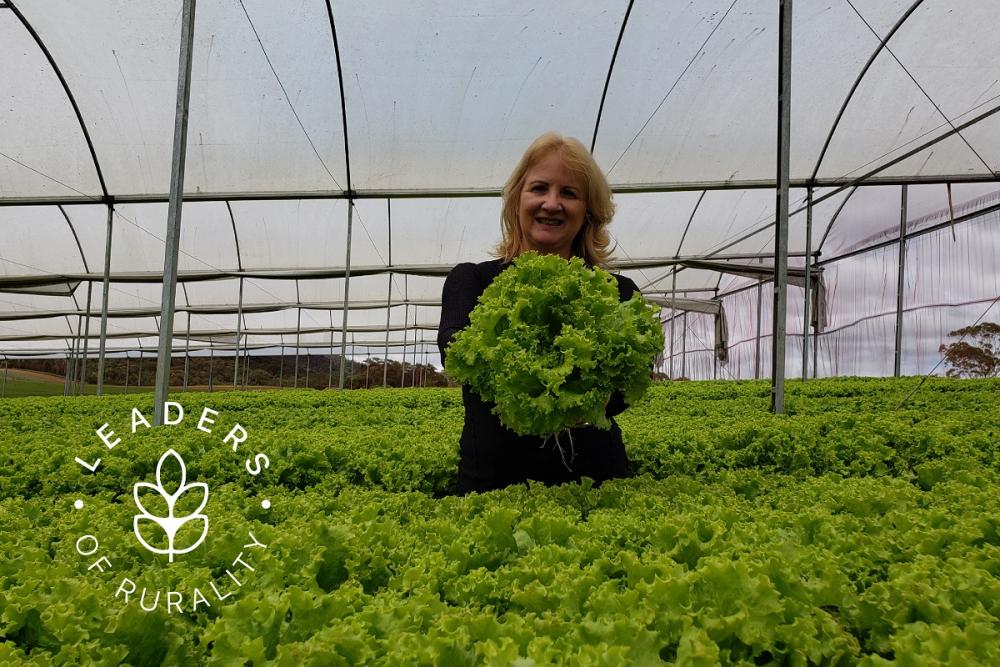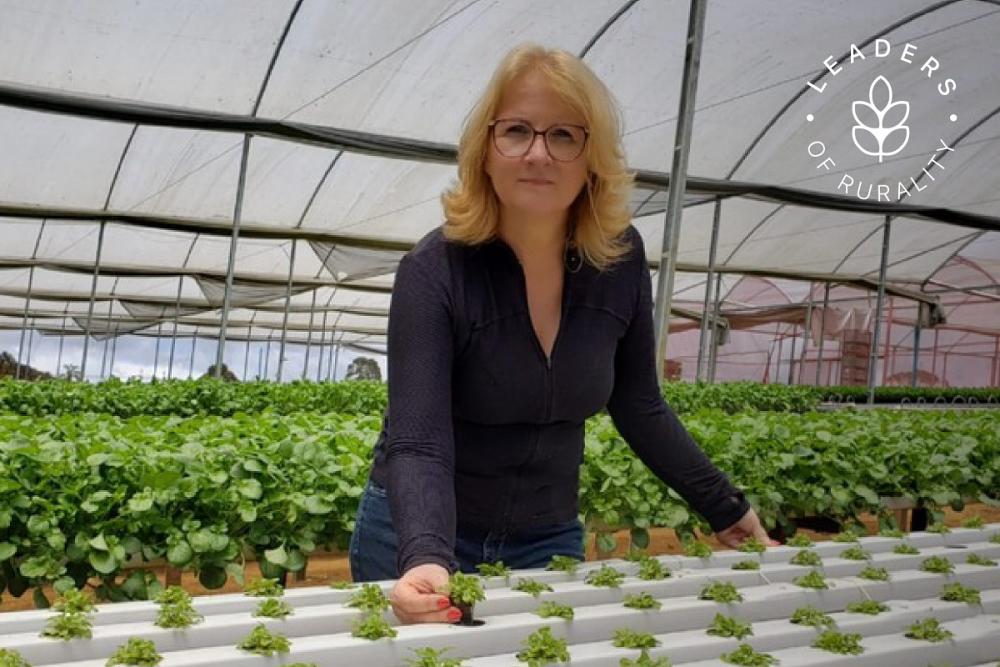“Do an incredible good” connects small farmers and organizations working with at-risk populations. It has already prevented 200 tons of food waste and benefited more than 100 farmers.

San Jose, 17 June 2021 (IICA). Simone Silotti, a Brazilian farmer and creator of “Do an incredible good”—a project that connects farmers and organizations working with at-risk populations—will receive the “Soul of Rurality” award, bestowed on noteworthy Leaders of Rurality in the Americas by the Inter-American Institute for Cooperation on Agriculture (IICA).
The award is part of an initiative by the specialized agency in rural and agricultural development to recognize the men and women who are leaving their mark and making a difference in the rural areas of Latin America and the Caribbean.
In addition to receiving the “Soul of Rurality” award, the Leaders of Rurality recognized by IICA will be invited to participate in several of the agency’s advisory bodies.
“This award pays tribute to those who are playing a unique dual role: guaranteeing food and nutritional security by producing under all circumstances, and protecting the biodiversity of the planet. It will also emphasize their capacity to be positive role models in the rural areas of the region”, stated Manuel Otero, Director General of IICA.
Within the framework of this initiative, IICA strives to ensure the recognition opens spaces for cooperation with state, civil society, and private sector organizations to gain support for their causes.
“These are people whose influence can be seen in the food that we eat—wherever it may end up—and in each plot of agricultural land and in the communities where farmers and their families live. These are men and women who are leaving their mark and are the soul of rurality because they produce, plant, harvest, create, innovate, and unite”, reflected IICA’s Director General upon launching the initiative.
“They embody silent leadership, which is something we should spotlight and recognize. Above all, they are role models, because they transform, overcome adversity, and inspire”, he added.
IICA is working alongside its 34 Delegations in the Americas to select the first #LeadersofRurality.
The results of the initiative’s first phase will be presented to IICA’s Executive Committee, one of the Institute’s governing bodies.
Simone Silotti: a farmer working to connect small producers and organizations to help bring food to the most vulnerable populations
Brasilia. A daughter of farmers, Simone Silotti spent most of her childhood in the field, until she moved into the city at the age of 12.
Her father had lost their farm, forcing him to move his wife and five children to the populated Metropolitan Region of São Paulo, where he rented a home and set out to work as a mason to provide for his family. A heart attack ended the life of Mário Silotti at the age of 53.
Simone describes that her father was unhappy because he didn’t “fit” in the city. After his death, the family stayed and Mário’s fourth child and only daughter finished her degree in Social Studies, at the insistence of her father, and began to work as a researcher. “He insisted that we all study”, she says.
It wasn’t until she was 46—separated and a mother of two—that Simone gave in to the nostalgia she felt for rural life and invited her brothers to be part of a company that would take them back to the farm.
“My childhood was the happiest time of my life. We lived in abundance: mandarins, sugarcane, brown sugar, eggs, and everything my mother made. Besides an abundance of food, we lacked everything else, but I always felt nostalgic for the past”.
Her brothers were on board and the family bought a 24,000-square-meter property in the town of Quatinga, Mogi das Cruzes, 90 km from São Paulo and one of the 39 municipalities of the Metropolitan Region’s green belt that guarantees food security to more than 16 million people.

The Silotti family planted lettuce, watercress, and hydroponic arugula to supply restaurants and grocery stores in the area. “We specialized. We established a sustainable production and used the latest technologies. I took courses in agroindustry. I wanted everything to go well and not relive my father’s fate”.
However, at 53, Simone found herself in debt and her property mortgaged. “Our production is excellent and we have a model farm. There isn’t a single document we don’t have”, said Simone, describing the difficulties she faced in gaining access to trade through the large retailers, forcing them to rely on intermediaries.
The harvesting period for greens is four days, which is one vulnerability of Simone’s business. “The intermediary doesn’t come to buy the produce on the first, second or third day—he comes on the fourth, and so the price goes down. We often have to sell at a price that doesn’t cover our costs or we lose the harvest”, she lamented. The same age as Mário when he died, Simone was disheartened and on the verge of depression.
Pandemic. In March of 2020, when things were already particularly difficult, the government of São Paulo announced isolation measures due to the coronavirus pandemic. Suddenly finding themselves without consumers and to avoid greater losses by having to hire workers for harvest, the farmers along the green belt began to destroy their production. The town of Quatinga alone would destroy six tons of vegetables.
“With so many people living with hunger, I couldn’t just accept the waste. I asked them not to destroy it, to trust me, that I would find buyers. Everyone was producing to meet the demand of Holy Week. We felt incredible sorrow”, remembers Simone.
After crying all day and not knowing how to keep her promise to her neighbors, she turned to the computer to organize a virtual food drive. Weeks later, farmers harvested and packaged their produce, while Simone sought out organizations that would donate to at-risk populations; however, the donations were very small and the food drive didn’t pan out.
The initiative captured the attention of an important local newspaper, which published an article describing the drive. After the article came out, Simone received a phone call from the director of Agroindustry at Banco do Brasil Foundation, the largest public bank in Brazil, who donated the equivalent of 180,000 US dollars. She then received donations from Yara Fertilizers and Braskem Petrochemicals, among others.
In May of this year, the project baptized “Do an incredible good” has already salvaged 200 tons of fruits and vegetables to distribute across 13 municipalities, benefiting more than 100 farmers and 100 NGOs and food kitchens. “That was the phrase I used to try to convince the donors. The project couldn’t have any other name”, explained Simone.
Simone is still in debt, but the project has cured her depression. The initiative has already won two awards and is competing for a third, which could provide the resources necessary to help fulfill another dream: transforming the initiative into a permanent, georeferenced virtual platform where farmers, NGOs, food banks and foundations can register, along with sponsors looking to fulfill their social responsibility agendas, especially the signatories of the 2030 Agenda for Sustainable Development. “The project fulfills 13 of the 17 objectives”, said Simone.
Simone is still in fear of having to abandon her farm, but she is much more confident and insists that everything that went wrong in her business prepared her to run the project, for which she is now seeking sponsors to help maintain and expand it.
“I trust in God and my father’s protection”, assured the daughter of farmer Mário Silotti.
More information:
Institutional Communication Division.
comunicacion.institucional@iica.int











